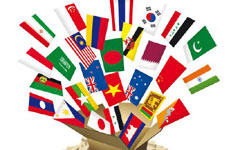Australia-China FTA moves closer
(Xinhua) Updated: 2014-11-10 10:00CANBERRA -- Australia and China are set to complete a second, multi-billion dollar trade deal within a week, reaching an agreement to lift exports and cut the price of some consumer goods.
The announcement comes as a historic free-trade agreement between the two countries grows ever closer, with Australian Foreign Minister Julie Bishop confirming on Monday she was " optimistic"
 |
Australian Prime Minister Tony Abbott and Chinese President Xi Jinping will finalize the new agreement next week at the G20 summit, which is expected to inject in excess of $15 billion into Australia's economy over the next decade.
Tariffs will be removed from Australia's biggest mineral and energy exports as a result of the new deal, while food producers will benefit from an increase in horticulture exports.
Australian legal, design and financial firms will also have increased access to Chinese markets and, in turn, Chinese investors will have a greater influence on the Australian share market due to relaxed investment rules.
The news comes as Bishop announced free trade agreements with Beijing were reaching a conclusion.
Australia has been in long-term negotiations with China regarding an agreement and, following $130 billion worth of two-way trade in the last financial year, an official announcement is expected imminently.
"It's looking very positive," Bishop told Fairfax Media. "Andrew Robb assures me that the areas of negotiation have narrowed significantly, so we are quite optimistic, but there's not an agreement until everything's agreed. "
"They're continuing to negotiate and I believe that some considerable progress has been made of recent days, so we will obviously push for as early an agreement as we're able to get."
However, Australian opposition leader Bill Shorten has criticized the government's announcement, suggesting details regarding the agreements need to be disclosed before the deal can be completed.
"What is in the deal? The government has been leaking out selectively good news -- I just want to see all the detail and the government should tell Australians what's really the case," Shorten said.
"I think a trade agreement is good if it works for your national interest. A trade deal is bad if it doesn't. We're interested in the creation of jobs and trade, but not necessarily just signing up to anything like a blank cheque."
- Cash crunch fans expectation on RRR cut
- US extends antidumping duties on China's thermal paper
- Modern food van with ancient look in Shanghai
- China home prices continue to cool in November
- Asia's top 3 billionaires all Chinese
- Old investment remedy the treatment for China's "new normal"
- China's solar sector opposes US anti-dumping ruling
- BMW to recall 846 cars in China

















